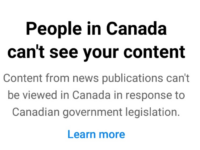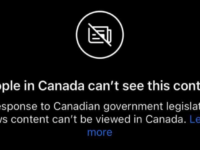Blocking of news links on Facebook and Instagram in Canada has becomes increasingly widespread in recent days, leading to a growing number of public comments from media outlets and reporters expressing surprise or shock about the scope of the link blocking. Indeed, outlets with blocked links include university student newspapers, radio stations, and foreign news outlets. While there may have been some errors (Facebook has a page to seek review of any blocked link decision), the inclusion of a very wide range of Canadian and foreign news outlets is no accident. Rather, it reflects the government’s Bill C-18 approach, which effectively covers all news outlets worldwide whose links are accessed in Canada. The Canadian government could have adopted a more targeted approach – for example, limiting the scope to news links from those news outlets eligible to negotiate agreements with Internet platforms under the law – but it instead went for the broadest possible approach that includes foreign news outlets with little or no connection to Canada.
Post Tagged with: "st-onge"
Media Publishers File Flawed Competition Act Application Over Meta Blocking News Links Due to Bill C-18
As the fallout from Bill C-18 continues, a coalition of Canadian media outlets – News Media Canada, the Canadian Association of Broadcasters, and the CBC – have filed an application with the Competition Bureau seeking an inquiry into Meta’s decision to block news links in response to the bill’s mandated payments for links approach. There is unquestionably a need for greater competition work with respect to Internet platforms, but a case grounded in refusal to link is not the place to start. Indeed, this complaint is exceptionally weak as it misstates Bill C-18, implausibly claims that Meta has substantial control over the news industry in Canada, contradicts the government on the choices presented by its legislation, and risks creating a mandated requirement to link that could result in other sectors forcing platforms to display more contentious content.
Backdown or Bailout?: What Comes Next for the Government’s Epic Bill C-18 Miscalculation
Meta’s announcement this week that it has started to block news links in Canada on both Facebook and Instagram due to Bill C-18’s mandated payments for links approach has sparked a flurry of commentary and coverage. News outlets such as Le Devoir have joined the Globe and Mail in expressing doubt about the government’s approach, news coverage has examined why the Meta ad boycott hasn’t taken off (hint: the government’s own party is still launching new ads) or why the Australian experience hasn’t been replicated in Canada (hint: different law, different time). Meanwhile, the political response has been discouraging with the government pretending to forget the Conservatives’ actual vote against Bill C-18 in the House of Commons, while the Conservatives insist on calling Bill C-18 a censorship bill when it isn’t. But perhaps the most interesting response is the speculation about what comes next. I don’t think anyone really knows, but this post offers a few possibilities.
The Lose-Lose-Lose-Lose Bill C-18 Outcome: Meta Blocking News Links on Facebook and Instagram in Canada
For months, supporters of Bill C-18, the Online News Act, assured the government that Meta and Google were bluffing when they warned that a bill based on mandated payments for links was unworkable and they would comply with it by removing links to news from their platforms. However, what has been readily apparent for months became reality yesterday: Meta is now actively blocking news links and sharing on its Facebook and Instagram platforms. The announcement does not reference Threads, but it would not surprise if news links are ultimately blocked on that platform as well. The company says that the blocking will take several weeks to fully roll out to all users, suggesting that it has learned from the over-blocking mistakes made in Australia and is proceeding more cautiously in Canada. By the end of the month, the world’s largest social media platform will become a news desert in Canada, with links to all news – both Canadian and foreign – blocked on the platform.
The Law Bytes Podcast, Episode 176: A Mid-Summer Update on Bills C-11, C-18, the Government’s Cabinet Shuffle, and the Brewing Battle over Digital Taxes
Coming off a week in which the government engineered a major cabinet overhaul that saw Heritage Minister Pablo Rodriguez replaced by Pascale St-Onge, an escalation of the battle over digital services taxes, and which featured significant news on both the Bill C-11 and Bill C-18 fronts, this week’s Law Bytes podcast provides a mid-summer update on recent developments. Barring some urgent news, the podcast will be taking a break in August and return in September.


Recent Posts
 The Law Bytes Podcast, Episode 231: Sara Bannerman on How Canadian Political Parties Maximize Voter Data Collection and Minimize Privacy Safeguards
The Law Bytes Podcast, Episode 231: Sara Bannerman on How Canadian Political Parties Maximize Voter Data Collection and Minimize Privacy Safeguards  The Law Bytes Podcast, Episode 230: Aengus Bridgman on the 2025 Federal Election, Social Media Platforms, and Misinformation
The Law Bytes Podcast, Episode 230: Aengus Bridgman on the 2025 Federal Election, Social Media Platforms, and Misinformation  The Law Bytes Podcast, Episode 229: My Digital Access Day Keynote – Assessing the Canadian Digital Policy Record
The Law Bytes Podcast, Episode 229: My Digital Access Day Keynote – Assessing the Canadian Digital Policy Record  Queen’s University Trustees Reject Divestment Efforts Emphasizing the Importance of Institutional Neutrality
Queen’s University Trustees Reject Divestment Efforts Emphasizing the Importance of Institutional Neutrality  The Law Bytes Podcast, Episode 228: Kumanan Wilson on Why Canadian Health Data Requires Stronger Privacy Protection in the Trump Era
The Law Bytes Podcast, Episode 228: Kumanan Wilson on Why Canadian Health Data Requires Stronger Privacy Protection in the Trump Era
Michael Geist on Substack
Get Postings via Email
Open Books
Broadcasting and Telecom Legislative Review Panel Report (BTLR)
Archives
| S | M | T | W | T | F | S |
|---|---|---|---|---|---|---|
| 1 | 2 | 3 | 4 | 5 | ||
| 6 | 7 | 8 | 9 | 10 | 11 | 12 |
| 13 | 14 | 15 | 16 | 17 | 18 | 19 |
| 20 | 21 | 22 | 23 | 24 | 25 | 26 |
| 27 | 28 | 29 | 30 | |||




